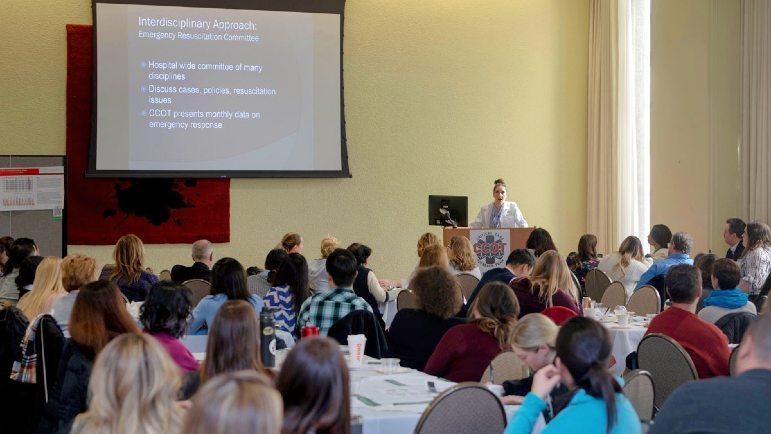Collaboration is vital when striving for excellence in patient care. The Critical Care Outreach Team at Rush has created an event designed to put this collaboration into practice.
On Feb. 20, 130 attendees comprised of nurses, practitioners and students from around the Chicago area and beyond gathered at Rush University Medical Center to celebrate and learn from each other at CCOT’s second annual Critical Care Outreach Symposium. Nurses from Illinois, Wisconsin and Ohio attended the event, which brought critical care nurses together for both education and collaboration.
CCOT asked themselves, “what can fellow nurses glean from each other to be more efficient in providing an ever better quality of care?” Through simulation and poster contests to a variety of guest speakers and group discussions, it was a day that brought new ideas to the table.
“We are getting good responses and feedback, getting to share with our colleagues in nursing and trying to grow our team in rapid response,” Jackie Hoskins, BSN, RN and president-elect of the Medical Center’s Professional Nursing Practice said at the event.
Forming relationships with numerous hospitals to work and grow together, participants were able to discuss and bring back new ideas to implement into their everyday work life. “It’s so exciting to see so many people come together to improve the care of patients,” explained Holly Losurdo, MSN, RN, critical care outreach nurse and team lead at Rush.
The symposium kicked off with a four-team simulation contest. While using simulations for critical care training is common, this one had a fresh twist: it was modeled after the popular “escape room” games. Teams had to complete one set of problems before being able to continue onto the next, and so on.
Hannah Prins, RN, who works at UChicago Medicine, participated in the simulation with the rapid response team she works with daily, which won the contest. “It was really helpful,” Prins said. “It helped me get into a different frame of mind.”
Following the simulation contest, guest speakers presented new research and shared their experiences in critical care. Featured speakers included Lorna Dudzik, DNP, RN, APN, CNS, and assistant professor at Lewis University College of Nursing & Health sciences on “Resuscitation Quality Improvement;” and Amie Gamino, MD, and assistant professor and assistant critical care medicine director at Rush on “Interdisciplinary Collaboration in CCOT.”
Participants of the symposium also created and displayed posters relating to various research, methods and new ideas for critical care. Each poster came with a QR code for attendees to scan, giving them the ability to see a version of each poster on their phone and save it for later to bring back to their own departments.
The symposium attendees particularly enjoyed the networking aspect. Event coordinators made sure to give the numerous nurses, students and practitioners plenty of time to foster relationships and learn from each other. The excitement was evident on participants’ faces as they shared experiences and bonded over their passion of caring for patients.
While the job in rapid response can be a hard one, it was easy to see every single person in the room loved what they do and appreciated the time they were getting to build a camaraderie with people who had the same passions.
Heather Cook, BSN, RN, CCRN, and a team lead for Rush’s critical care outreach, was enthusiastic about the amount of engagement the symposium saw. “I’m honored that all of these nurses came here to learn about this specialty,” she said. “We get to set the standards for (critical) care by having this and have felt so supported by Rush to hold it.”
While the Critical Care Outreach Symposium is only in its second year, it is a growing success, because it meets the need Rush’s critical care outreach team saw for the rapid response community to come together and collaborate.
“All of our hospital peers have critical care patients that provide intensive nursing care and acute care nurses need the support and resources to assist in providing excellent care too,” said Shonda Morrow, AVP, nursing finance and resource management at Rush. “As in any industry you need to come together and ask, ‘this is what we’ve done but how can we do better?’”

